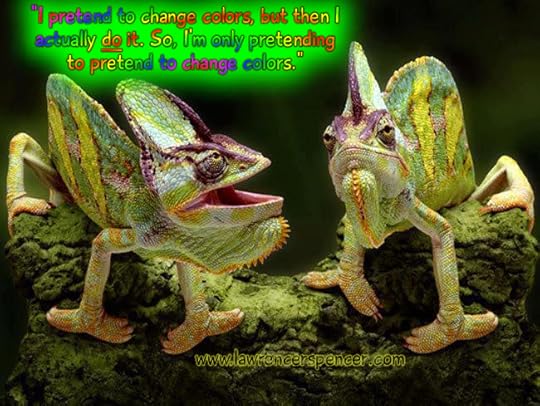Lawrence R. Spencer's Blog, page 34
June 9, 2024
ABE LINCOLN PROPHECY HAS BEEN FULFILLED
June 8, 2024
SLAVE
Republished by Blog Post Promoter
“As long as one chooses to assign responsibility for creation, existence and personal accountability for one’s own thoughts and actions to others, one is a slave.”
PRETEND TO PRETEND
Republished by Blog Post Promoter

In order to change anything in this universe you have to pretend to pretend….
June 5, 2024
June 4, 2024
June 2, 2024
CALL AN ERECTRICIAN
Republished by Blog Post Promoter
A friend of mine says he e-mailed this photo of a Viagra sales promotion gimmick to a Japanese doctor friend of his. The doctor emailed back:
“If light stay on more than 4 hour, call erectrician.
PHANTASTIC PHOTOGRAPHS
Republished by Blog Post Promoter
PHANTASTIC PHOTOGRAPHY BY Robbert van der Steeg
__________________________
________________________________________
THE MAZE
Republished by Blog Post Promoter
“IN MAZES OF IMAGININGS
ALL SENTIENT BEINGS DREAM
‘I AM THE WHO WHO’S THINKING’
THE ILLUSIONS THAT I SEE.
WE CAN ESCAPE MORTALITY:
DELUSIONS WE’VE BEEN TOLD.
WE’RE LIVING THROUGH ETERNITY
AS IMMORTAL SOULS.”
__________________
Lawrence R. Spencer. 2013.
June 1, 2024
DEATH EXPRESSED IN SALT
Republished by Blog Post Promoter
This video shows the artist, Motoi Yamamoto, expressing grief over the death of his sister with paintings made of salt. It is marvelous.
May 31, 2024
MENTAL INSTITUTION OF THE UNIVERSE
Republished by Blog Post Promoter
 __________________________________________________________________________
__________________________________________________________________________
Johann Wolfgang von Goethe ( 28 August 1749 – 22 March 1832) was a German writer, artist, and politician. His body of work includes epic and lyric poetry written in a variety of metres and styles, prose and verse dramas, memoirs, an autobiography, literary and aesthetic criticism, treatises on botany, anatomy, and colour, and four novels. In addition, numerous literary and scientific fragments, and over 10,000 letters written by him are extant, as are nearly 3,000 drawings.
A literary celebrity by the age of 25, Goethe was ennobled by the Duke of Saxe-Weimar, Carl August in 1782 after first taking up residence there in November of 1775 following the success of his first novel, The Sorrows of Young Werther. During his first ten years in Weimar, Goethe served as a member of the Duke’s privy council, sat on the war and highway commissions, oversaw the reopening of silver mines in nearby Ilmenau, and implemented a series of administrative reforms at the University of Jena. He also contributed to the planning of Weimar’s botanical park and the rebuilding of its Ducal Palace, which in 1998 were together designated an UNESCO World Heritage Site.[2]
After returning from a tour of Italy in 1788, Goethe published his first major work of a scientific nature, the Metamorphosis of Plants. In 1791 he was charged with managing the theatre at Weimar, and in 1794 he began a friendship with the dramatist, historian, and philosopher Friedrich Schiller, whose plays he premiered until Schiller’s death in 1805. During this period Goethe published his second novel, Wilhelm Meister’s Apprenticeship, the verse epic Hermann and Dorothea, and, in 1808, the first part of his most celebrated drama, Faust. His conversations and various common undertakings throughout the 1790’s with Schiller, Johann Gottlieb Fichte, Johann Gottfried Herder, Alexander von Humboldt, Wilhelm von Humboldt, and August and Friedrich Schlegel have, in later years, been collectively termed Weimar Classicism.
Arthur Schopenhauer cited Wilhelm Meister’s Apprenticeship as one of the four greatest novels ever written and Ralph Waldo Emerson selected Goethe, along with Plato, Napoleon, and William Shakespeare, as one of six “representative men” in his work of the same name. Goethe’s comments and observations form the basis of several biographical works, most notably Johann Peter Eckermann’s Conversations with Goethe. There are frequent references to Goethe’s various sayings and maxims throughout the course of Friedrich Nietzsche’s work and there are numerous allusions to Goethe in the novels of Hermann Hesse and Thomas Mann. Goethe’s poems were set to music throughout the nineteenth century by a number of composers, including Ludwig van Beethoven, Franz Schubert, Robert Schumann, Johannes Brahms, Hugo Wolf, and Gustav Mahler. (Wikipedia.org)













